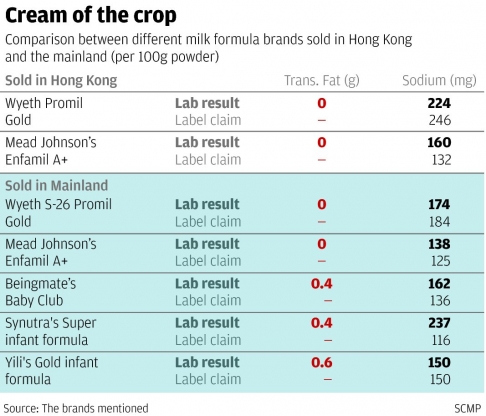Three popular mainland milk powder brands contain trans-fat that experts say could lead to heart disease and should be avoided by infants, a laboratory test commissioned by the South China Morning Post has found.
The tests found that the three brands - Beingmate's Baby Club, Synutra's Super infant formula, and Yili's Gold infant formula - each contain between 0.4 and 0.6 grams of trans-fat (trans-fatty acids) per 100 grams of milk powder.
But no trans-fat is indicated on the packaging. Mainland law does not require labels on baby formula to state the trans-fat content.
The levels of trans-fat in the formula fall within mainland and international safety standards.
One of the brands - Synutra's Super infant formula stage 1 - was also found to contain twice as much sodium as the packaging says it does, although the level was within international safety standards.
The tests found trans-fat in the Beingmate and Synutra formula at a level of 0.4 grams per 100 grams and in the Yili formula at a level of 0.6 grams. None of the brands is sold in Hong Kong.
Two popular overseas formula brands, made by Mead Johnson and Wyeth's, were also tested. Both products, sold in Hong Kong and the mainland, were found to contain no trans-fat.
The Codex Alimentarius Commission, the international food standards-setting authority, caps the limit of trans-fat in infant formula at no more than 3 per cent of total fatty acids - a standard adopted by the mainland.
Hong Kong has not set limits for the trans-fat content of baby formula, but has said it is considering adopting the same Codex limit.
The United States Food and Drug Administration says trans-fat should not exceed 0.5 grams per serving of food. The World Health Organisation recommends that, for an adult, trans-fat should be limited to not more than one or two grams per day.
Although the trans-fat level found in the mainland formula brands was within international limits, local experts warned that parents should make an informed choice and avoid feeding their infants the substance.
"It is always safer to keep the consumption level of trans-fat to a minimum, especially among infants," said William Chui Chun-ming, president of the Society of Hospital Pharmacists. "Formula is their only source of nutrients, and drinking it all day means their intake could be high."
Chinese University paediatrics professor Ellis Hon Kam-lun explained that if trans-fat made up too much of an infant's intake of fat, it may affect brain and eye development. Long-term over-consumption of trans-fat can lead to heart and circulatory diseases.
Chiu said trans-fat can occur naturally in food, or emerge when food is processed.
For the test, the Post bought five cans of infant formula on the mainland - the three mainland brands and two overseas brands; and bought two cans of the two overseas brands in Hong Kong for comparison.
They were taken to a certified laboratory and tested for their levels of energy, the seven nutrients specified for labelling, and melamine. None of the samples was found to contain melamine, an industrial chemical used to adulterate substandard milk on the mainland. Melamine-adulterated formula killed at least six babies and made 300,000 ill in 2008.
A spokeswoman for Beingmate said it had never added anything to its milk formula in breach of mainland regulations.

Source:South China Morning Post